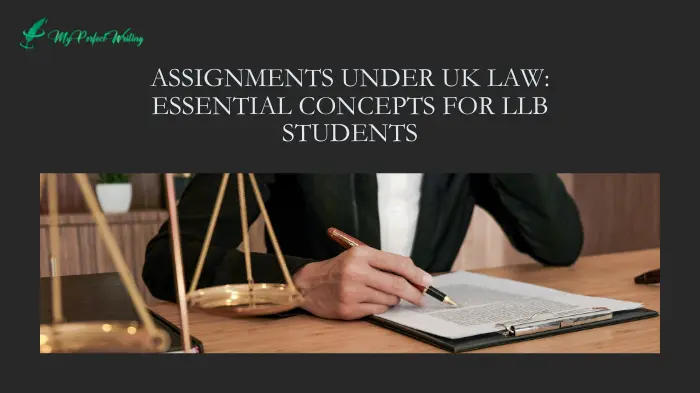What Is an Assignment Under UK Law?
An assignment refers to the transfer of contractual rights from one party (the assignor) to another (the assignee). Unlike novation, an assignment only transfers benefits — not burdens — which means obligations remain with the original contracting party.
Types of Assignment Under UK Law
1. Legal Assignment
A legal assignment is governed by the Law of Property Act 1925, requiring:
- The assignment is to be in writing,
- absolute and unconditional,
- and notice given to the debtor.
Legal assignments allow the assignee to sue in their own name. For official statutory wording, refer to theLaw of Property Act 1925onlegislation.
2. Equitable Assignment
If the formal requirements are not met, the assignment is considered equitable. This means the assignee cannot sue in their own name but must rely on the assignor being part of the proceedings.
3. Assignment by Operation of Law
This includes transfers through bankruptcy, death, or merger.These assignments do not require consent because they arise automatically.
What Rights Can Be Assigned?
Under UK contract law, only the benefits of a contract can be assigned — not the burdens. This means a party can transfer what they are entitled to receive, but not what they are required to do.
Common rights that can be assigned include:
- Contractual payment rights:
If someone is owed money, they can assign the right to receive that payment to someone else. - Intellectual property benefits:
Royalties, licensing income, or usage rights can be transferred to another person. - Insurance policy entitlements:
Some insurance benefits—like payout rights—can be assigned (depending on policy terms). - Rights under a lease:
A tenant may assign certain lease benefits, such as the right to occupy, if the agreement allows it.
But obligations (like repaying a loan, completing work, or performing duties) cannot be assigned, because the original party must still fulfil them. To transfer obligations, you need novation, which replaces the original party with a new one, with the consent of everyone involved.
When Can Rights Not Be Assigned?
There are situations where assignment is not allowed, either because the law restricts it or the nature of the contract makes it inappropriate.
Rights cannot be assigned when:
- The contract involves personal services:
These require a specific person’s skills, like tutoring, coaching, or legal advice. You can’t transfer someone else’s duty to perform personal work. - Employment duties:
An employee cannot assign their job responsibilities to another person. - The contract prohibits assignment:
Many agreements include clauses that explicitly prevent transferring rights without consent. - Government-issued benefits:
Some rights, such as certain licences, pensions, or permits, cannot legally be transferred.
Assignments are also invalid if they breach public policy or a statutory rule — meaning they go against legal standards or government regulations.
Assignment vs Novation
Students often confuse the two. Here’s the difference:
|
Assignment |
Novation |
|---|---|
|
Transfers rights only |
Transfers both rights and obligations |
|
Consent of the other party is not required |
Consent of all parties required |
|
Original party still liable |
Original party released |
Why Students Struggle With Assignment Questions
Contract assignment problems require:
- identifying which rights are transferable
- recognising legal vs equitable assignment
- applying statutory notice requirements
- analyzing if consent is needed
- Comparing the assignment with the novation
These steps confuse, especially in LLB problem questions.
How My Perfect Writing UK Supports Law Students
Expert Legal Writers
My Perfect Writing team provides accurate explanations, real case examples, and properly structured answers for contract law topics. Whether it’s an assignment, novation, or enforceability, we help you understand and write clearly.
Affordable Assistance
Get professional law essay help UK and contract analysis without overstretching your budget. Support is available for essays, coursework, and case briefs.
Fast Turnaround
Deadlines for law coursework can be tight. Our law assignment writing UK support ensures timely delivery with accurate arguments and full referencing.
Guidance Across All Modules
From contract to property, equity, administrative law, tort, and more — our service supports every major module through expert law student assignment writing services.
Conclusion
Understanding assignments under UK law is essential for mastering contract principles. With clear rules on rights transfer, enforceability, and the distinction between legal and equitable assignments, students can approach coursework with confidence. If you need help applying these concepts or structuring your answers, professional support is available.
If you want clarity and strong legal writing, My Perfect Writing can step in and write my law assignment with accuracy and on time.
Frequently Asked Questions
What does an assignment mean under UK contract law?
An assignment allows one party to transfer its contractual rights or benefits to another. Duties remain with the original party unless the contract is novated.
Can contractual obligations be assigned?
No. Only rights can be assigned. Obligations such as repayment or performance can only be transferred through novation with the consent of all parties.
When can rights not be assigned?
Rights cannot be assigned if a contract restricts it, if the duty is personal, or if the benefit is non-transferable under statute or public policy.
Do you help with contract law assignments on assignment and novation?
Yes. My Perfect Writing law student assignment writing services assist with essays, case analysis, and problem questions covering assignment, novation, enforceability, and related topics.
Can you help me write coursework or solve problem questions on assignment, novation, or rights transfer?
Absolutely. Whether you are working on essays, case notes, or problem questions, our law essay help UK service provides clear explanations, accurate case application, and structured legal reasoning.
Meet Our Professional Essay Writers
Empowering Your Academic Writing Journey with Authority, Expertise, and Experience
Dr. Emma Wilson
PhD in Literature
Prof. James Chen
MSc in Computer Science
Dr. Sarah Ahmed
PhD in Law & Ethics
Ready to Work With Our Expert Writers?







